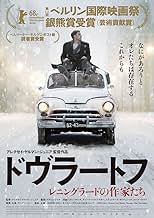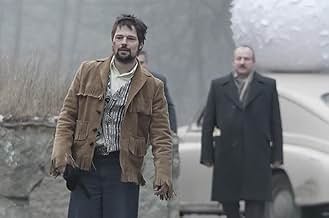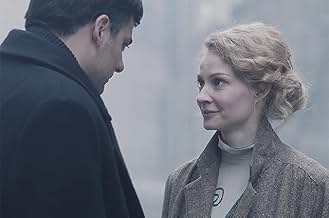AVALIAÇÃO DA IMDb
6,4/10
2,3 mil
SUA AVALIAÇÃO
Adicionar um enredo no seu idiomaThe film actions unfold in 1971, telling about the four days of life of famous writer Sergei Dovlatov. The film raises the eternal issue of the Russian and European culture - the issue of mo... Ler tudoThe film actions unfold in 1971, telling about the four days of life of famous writer Sergei Dovlatov. The film raises the eternal issue of the Russian and European culture - the issue of moral choice.The film actions unfold in 1971, telling about the four days of life of famous writer Sergei Dovlatov. The film raises the eternal issue of the Russian and European culture - the issue of moral choice.
- Direção
- Roteiristas
- Artistas
- Prêmios
- 5 vitórias e 11 indicações no total
Danila Kozlovsky
- David
- (as Danila Kozlovskiy)
Tamar Hovhannisyan
- Nora Dovlatova - Sergei Dovlatov mother
- (as Tamara Oganesyan)
Anna Yekaterininskaya
- Deputy director of the plant
- (as Anna Ekaterininskaya)
Sergei Tolstov
- Factory Newspaper Editor
- (as Sergey Tolstov)
Maria Järvenhelmi
- Finnish tourist
- (as Mari Yarvinkhelmi)
Nikolai Shatokhin
- Dovlatov's friend
- (as Nikolay Shatokhin)
- Direção
- Roteiristas
- Elenco e equipe completos
- Produção, bilheteria e muito mais no IMDbPro
Avaliações em destaque
I have to admit I was shocked by the low quality of the acting. Most conversations (and in this movie there are plenty of those) seem really unnatural and awkward, most actors seem to recite their lines as if they were reading them from a paper... There is neither chemistry, connection nor emotion between the actors whatsoever: they seem to be talking past each other instead of to each other (maybe on some occasions it's deliberate, but this is happening throughout the whole movie, which makes it completely absurd.. ). Female characters have no importance on their own terms - they are only there to serve as background to the male characters. Weirdly, all females have bags under their eyes... Slight positives: the main character is mildly charismatic and the movie gives you a glimpse into how live could have been during the seventies in Russia (no idea if it's accurate enough). However, overall the movie is quite a waste of time, unfortunately.
Dovlatov is a good biographical film about a famous Russian writer. The majority of biographical films are divided into 2 types: either the film tells the whole life of a person or in detail about some period of life. It is type 2 that I consider preferable, as in 2-2.5 hours of conditional timing it is difficult to lay down a whole life of a person. Dovlatov is just such a film, the action of the film unfolds in just a couple of days 1971. Transfer of an era, life and life of Leningrad of the 1970th years simply 10/10. One of the best films about the period of Brezhnev stagnation of society. Just a good film, in which there are only dialogues and internal conflict of the writer, who alone opposes the state structure.
Why? I was waiting for this movie and familiar with Dovlatov's story, but the movie was disappointing from the very beginning. First, something is completely wrong with the way Main actor talks. He murmurs, doesn't pronounce half of the letters and sound completely non-professional. Second, the work of director very primitive. Also, acting stars were only supporting characters and you couldn't really enjoy enyone's performence. Overall, feels like everyone is slacking while working on that movie set.
Saw this at the Berlinale 2018, where it was part of the Competition for the Golden/Silver Bear. A lot of faces pass by, in crowded apartments or various other just as crowded places. Some of those faces will reappear several times. No need to remember all of them, apart from the main protagonist, his ex-wife and daughter of course, as there is no continuing story that brings you from A via B and C to Z.
The division in six days is also not really relevant. It gives you a clear marker, however, that the movie jumps to something completely different each time a date appears on screen. It provides for some structure albeit not crucially important.
There is room for humor, not too much as there is no happy ending (no spoiler: we know this writer was not recognized in his own country and emigrated later, and we also know his own country valued him not until after his death).
Be prepared for name dropping of several famous writers, most of whom I recognize vaguely by name, but have never read them in my life. Maybe you have better luck in fitting them in the context in which their name is mentioned, and judge the name dropping as appropriate or merely done out of pomposity (I assume the former, given the circles our main protagonist usually is in, where one surely knows these names and would protest immediately when improperly quoted).
Trick question: did this movie enlighten me about the period and Russian politics at the time?? No, I think not. But anyone who has read some of the writers who have been quoted, may think otherwise. Several reviewers mentioned that it was a time of a stand still.
What this movie makes abundantly clear, is that the regime does not allow frivolities with their policy, keeping a tight lease on all publications such as journals, magazines and books. It is something that all such regimes seem inclined to do as a matter of course. Is that only to close the ranks, out of fear that the communist dream is not so rosy as one is taught?? Or it is just to not endanger the positions of the current politicians?? I assume that all of the above applies. It seems to apply equally to contemporary dictatorial regimes (Turkey, Iran, and many others), a parallel observation that makes this movie more relevant than it intrinsiccally is when considering the Brezjnew period alone.
The division in six days is also not really relevant. It gives you a clear marker, however, that the movie jumps to something completely different each time a date appears on screen. It provides for some structure albeit not crucially important.
There is room for humor, not too much as there is no happy ending (no spoiler: we know this writer was not recognized in his own country and emigrated later, and we also know his own country valued him not until after his death).
Be prepared for name dropping of several famous writers, most of whom I recognize vaguely by name, but have never read them in my life. Maybe you have better luck in fitting them in the context in which their name is mentioned, and judge the name dropping as appropriate or merely done out of pomposity (I assume the former, given the circles our main protagonist usually is in, where one surely knows these names and would protest immediately when improperly quoted).
Trick question: did this movie enlighten me about the period and Russian politics at the time?? No, I think not. But anyone who has read some of the writers who have been quoted, may think otherwise. Several reviewers mentioned that it was a time of a stand still.
What this movie makes abundantly clear, is that the regime does not allow frivolities with their policy, keeping a tight lease on all publications such as journals, magazines and books. It is something that all such regimes seem inclined to do as a matter of course. Is that only to close the ranks, out of fear that the communist dream is not so rosy as one is taught?? Or it is just to not endanger the positions of the current politicians?? I assume that all of the above applies. It seems to apply equally to contemporary dictatorial regimes (Turkey, Iran, and many others), a parallel observation that makes this movie more relevant than it intrinsiccally is when considering the Brezjnew period alone.
It's not an easy movie for the viewer. However, it is an addictive cinema. The film is a biography of a writer who did not live to see his work published during his lifetime, so it focuses on impotence, unfulfillment and bitterness. A few days from Dovlatov's life, which we observe on the screen, is therefore a pretext for showing his everyday work - the attempts to publish a text instead of a little ambitious journalistic texts, showing his family and friends, the bohemian environment of Leningrad / St. Petersburg.
The film has a very calm rhythm, it is beautifully photographed and well played. The central figure is the ubiquitous Milan Maric (strikingly similar to Sergei Dovlatov), but although he is present on the screen in almost every scene, he does not dominate history and other characters.
Definitely worth seeing is a film for all those who are interested in showing the creative process on screen or in the reality of life in Soviet Russia.
The film has a very calm rhythm, it is beautifully photographed and well played. The central figure is the ubiquitous Milan Maric (strikingly similar to Sergei Dovlatov), but although he is present on the screen in almost every scene, he does not dominate history and other characters.
Definitely worth seeing is a film for all those who are interested in showing the creative process on screen or in the reality of life in Soviet Russia.
Você sabia?
- ConexõesFeatures Romantyczni (1970)
Principais escolhas
Faça login para avaliar e ver a lista de recomendações personalizadas
- How long is Dovlatov?Fornecido pela Alexa
Detalhes
- Data de lançamento
- Países de origem
- Centrais de atendimento oficiais
- Idiomas
- Também conhecido como
- 文字慾
- Locações de filme
- Empresas de produção
- Consulte mais créditos da empresa na IMDbPro
Bilheteria
- Faturamento bruto mundial
- US$ 2.187.653
- Tempo de duração
- 2 h 6 min(126 min)
Contribua para esta página
Sugerir uma alteração ou adicionar conteúdo ausente

![Assistir a Trailer [OVS]](https://m.media-amazon.com/images/M/MV5BZjQ0ODcwYTMtZmU2OC00ZDFlLTkyZTgtY2Y0NDFjMjJmNmZlXkEyXkFqcGdeQXRyYW5zY29kZS13b3JrZmxvdw@@._V1_QL75_UX500_CR0)






























